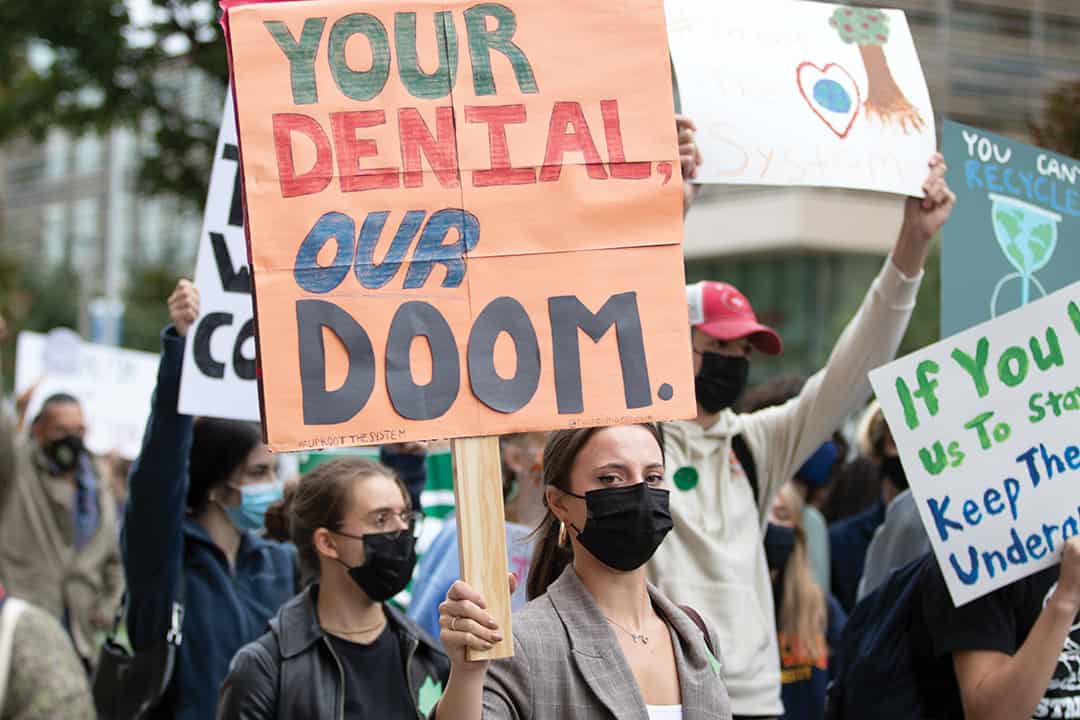From blizzard warnings in Toronto in mid-January to the raging Marshall fires raging in Colorado in late December, nature’s cries are now louder than ever. They are desperate cries to the global elite — big tech, big banks, and big governments — to wake up and smell the ash and smog.
When they implement various climate change policies, states and large corporations appear to have the environment in mind. However, these policies are nothing more than a facade that the elite employ to show that they seemingly care. In the end, the elite are guided by market models and data trends rather than a genuine concern for the environment.
So, the question becomes this: will we finally look up and realize the severity of the climate crisis, or will we continue as we are — in a society where only individualism matters?
Strides toward better climate outcomes
The conclusion of the 2021 United Nations Climate Change Conference (COP26) left global climate policy activists and critics with even more ambiguity to decipher.
One of the most significant policies to come out of the convention was the Glasgow Climate Pact, which details new approaches to climate change policy and recognizes the need for immediate and “multi-institutional” action. A key finding that came from COP26 was the urgent need to introduce pledges from non-state actors — including private companies that can tackle the financial barriers states have been facing.
The importance of curbing methane emissions was also a talking point at this year’s COP26, as China and the US talked ambitiously about curbing their emissions. India pledged 450 gigawatts of clean energy, while some other countries pledged to phase out from unclean fuels.
Youth organizations have also been vocal about ensuring that everyone gets a say. Today’s youth have shown the ability to actually push for tangible change. Meanwhile, the US’ implementation of Biden’s First Movers Coalition of companies has led huge tech corporations such as Amazon, Apple, and United Airlines to order zero-carbon ships, green steel, and 85 per cent cleaner jet fuel, accelerating demand in these promising industries.
Responses are coming from all societal classes. The immense rise of countries from the Global South to become some of the world’s great powers — most notably China and India — has been both a boon and a curse. On one hand, their policy pledges demonstrate an effort to become greener, and their financial and institutional dependencies on other nations have significantly decreased due to progress in the dampening of geopolitical constraints, a hike in globalization, and advancements in technology.
On the other hand, their growth has added to the climate crisis. This has come in the form of an increased dependency on fossil fuels during high growth periods in the relatively recent past, along with significant increases in population. As a result, human-settled areas have expanded into more forest land and the population is dependent on more international market-based resources.
Making sure we don’t fall further short
Despite the progress we have made toward better climate outcomes, the reality is that solutions to the climate crisis cannot be formed in our current system. Trusting officials to make choices on topics like climate change may have seemed like a good idea on paper, but it may not always be in the best interest of the people in reality.
In the aftermath of WWII, we hoped that liberal ideas would lead to governments that ensured an equal spread of power for the betterment of society. However, we were slow to realize such an optimal situation isn’t possible in politics.
In order to maintain a good and responsible government, it’s important that states consider endless policy nuances about multiculturalism, the inequitable spread of wealth, and the considerations of Indigenous communities. Focusing on each of these nuances generates considerably different levels of urgency when acting on behalf of the environment. To me, balancing this focus seems to be the greatest challenge for governments as they try to form environmental policies to oversee all of these concerns. In my opinion, a lot of these discussions are ruled by byproducts of the market mindset.
What society desperately requires is a transitional phase where the ideologies of the ‘new’ can outdo the ‘old.’ The current market mindset is clearly not going to cut it now. This is not to say that all the old must go — but we must challenge old ideas and look at how the building blocks of society have led us to this reality. There are problems with how elites have modeled the issue of the environment and its relation to us.
Policies so far seem to have been generated with one, and only one, aim in mind: maximum profit. This profit-maximizing agenda is veiled in economic and political jargon that has locked us into believing they are doing us good, but the reality is far removed from those empty promises.
But individuals can still recognize this cycle and call these elites out, holding them responsible for handing us the short end of the climate stick while they stand high and mighty.
I am not asking you to change your values but to challenge them. Challenge the individuals who believe in faulty ideals that technology or an escape from the realities of our current situation is the solution to the greater problems of life. It is precise and targeted action that has helped humanity step out of crises before, and it is what is required of us now.
Aryan Khemka is a third-year political science, environmental studies, and environmental ethics student at St. Michael’s College.


